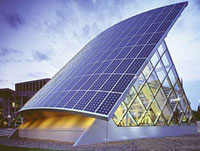China unveils feed-in tariff for solar power
 China has announced its first nationwide feed-in tariff for solar projects in a step that underscores the determination of the world’s biggest energy user to move toward renewable energy.
China has announced its first nationwide feed-in tariff for solar projects in a step that underscores the determination of the world’s biggest energy user to move toward renewable energy. Beijing has made renewable energy a keystone of its energy policy and aims to raise solar power capacity tenfold in the next five years. The long-awaited feed-in tariff guarantees solar developers a payment of 1 yuan per kilowatt-hour that their projects feed into the grid, or 1.15 yuan per kh in some cases depending on the timing and location of the project.
At a time of slowing global demand as big markets such as Germany and Italy reduce subsidies for solar panels, Beijing’s increasing support will see the country – already the world’s largest maker of solar panels – become one of the world’s biggest buyers of solar panels in coming years, according to analysts and industry executives.
“We strongly believe that China will quickly evolve into one of the largest and most important solar markets in the world,” said Liao Mingsheng, chief executive of Yingli, one of China’s largest vertically integrated solar panel manufacturers.
At the headquarters of Yingli in Baoding, outside Beijing, developers are busy designing products to suit the Chinese market – including solar tents for the Chinese military, and solar panels that fit on yaks’ backs for Tibetan herders. Last year the Chinese market accounted for just five per cent of the company’s sales, but that figure could double by next year, according to company statements.
While analysts disagree on how profitable Chinese solar projects will be under the new tariff, the announcement is widely seen as an affirmation of Beijing’s intent to support the solar industry. A similar tariff has been in place for wind projects since 2009, propelling China to become the world’s biggest wind farm operator. Industry executives said that many Chinese solar developers had already been setting up projects this year in anticipation of a good tariff coming through.
“The demand [in China] has kicked up significantly in the course of this year,” said Andrew Beebe, chief commercial officer for Suntech, one of the world’s largest solar manufacturers. “It’s been a small portion of our business historically but it is definitely gaining.”
Others suggest Beijing is seeking to counterbalance the global fall in demand for solar panels to help ease the pain of Chinese solar manufacturers, who account for more than half of solar cell production globally.
The new tariff will apply only to solar projects that are not awarded through a competitive bidding process, as those projects are typically awarded to the developer who can accept the lowest feed-in price.
You can return to the main Market News page, or press the Back button on your browser.

